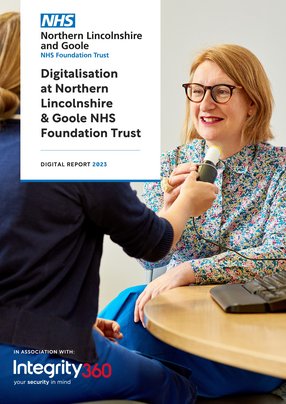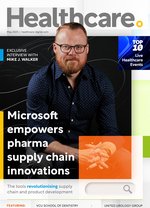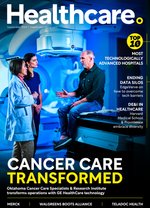Across the world, healthcare organisations are taking the lessons they’ve learned during COVID-19 and using them to make their service safer for staff and patients, as well as more efficient. Digitalisation is a huge part of this growth.
Shauna McMahon is the Group Chief Information Officer for Northern Lincolnshire and Goole and Hull University Teaching Hospitals. Northern Lincolnshire and Goole is an NHS Foundation Trust, while Hull University is a Teaching Hospital NHS trust. She is a member of both hospital boards, as well as the two executive teams. She’s learned a lot about the NHS since arriving from Canada in 2015.
“I thought it would be an interesting experience! But prior to this role, I worked as the CIO at Frimley Health,” explains McMahon. “I've worked in the private and public sectors, in banking and consulting. However, most of my career has been in healthcare.”
McMahon has a passion for how digital healthcare can improve the working lives of people in the industry, as well as how it improves the care delivery for patients.
“It makes the access easier for patients,” she explains. “It's a really exciting area to work in because healthcare is always changing and developing.”
Kris Weavill is the Diagnostic and Imaging Systems Manager for NLaG and came to the NHS in 2015 as a ward clerk.
“My role now is around the frontline management of our radiology, cardiology, medical physics and nuclear medicine suites of software,” says Weavill. “It's an interesting role – I'm a technical specialist, but I'm also a liaison at a clinical level. I sit in the middle and do high-end technical work, project management and business case management. I even have responsibilities at an operational level as there are patient pathways that my team are responsible for.”
Weavill gets a slice of everything – the business, the patient care and the technical work.
“It’s really fulfilling,” he adds. “We're a geographically diverse trust. We have the port towns of Grimsby and Cleethorpes, which are geographically isolated on two corners. That brings with it a lot of interesting statistics.”
There are high levels of deprivation in the area, high levels of diabetes and higher rates of lung cancer. The region is one of the 20% most deprived districts in England, while 26% of children come from low-income families.
“We have Scunthorpe in the middle, which is a big steel-producing town that has a mixture of urban areas and some very wide rural areas,” Weavill continues. “Then we have our Goole campus, which is an hour-and-a-half away from Grimsby.” Hull Royal Infirmary is in downtown Hull, while the Castle Hill Hospital is situated in Cottingham.
Transformational technology in healthcare
McMahon and Weavill are excited to bring about transformational technology to Northern Lincolnshire and Goole NHS Foundation Trust. There have been several interesting projects in the last few years, including securing augmented reality glasses for community nurses.
“We are one of five trust sets piloting the use of the NHS app for the Wayfinder project,” says McMahon. “This will enable the patients to have access to information on the NHS app. We are also working on four robotic processing automation tools to help with the processing of patient referrals and also help with the recruitment process within our organisations.”
Currently, the team is in the process of unifying their patient admin system, allowing them to see all the patients on the waiting lists, as well as the activity of patients across the two organisations.
“We're also putting in a solution which might be overlooked by some, which is called ManageEngine,” explains McMahon. “What that's going to do is consolidate our digital services. So we have one service desk, one way to access the support you need for the two organisations and manage the service we offer.”
The radiology systems also received an update, resulting in a significant reduction in waiting times.
“We are part of the collaborative team that procured a single-PACS solution for about seven acute trusts,” explains Weavill. “What that enabled during COVID-19 was real-time image sharing and report sharing with our clinicians, largely thanks to the Agfa Healthcare Xero platform. Traditionally in the radiology world, if a consultant at another hospital wanted to see someone's images, it would either be a mixture of putting them in a disc in the back of a taxi – or smoke signals. Now, we have real-time sharing and we don't need to get involved. It's always quite refreshing when we get phone calls from consultants or doctors saying they need certain images, and we can say ‘they're already there!’”
Jackie France, Associate Director of Patient Services, is leading on many of the patient-centred digital programmes. NLAG is one of five NHS trusts to pilot a new NHS App functionality that will transform the way patients access and manage appointments.
The project, known as Wayfinder, is part of a national strategy led by NHS England to improve patient experience and tackle NHS backlogs – positioning the NHS App as the “front door” to NHS services. The pilot, which went live across NLAG at the end of February, enables patients to see and manage their appointments, referrals and, in time, their test results and waiting times. It is already proven that, in providing patients with more control over their appointment bookings and making it easier to book, cancel or reschedule, trusts experience a reduction in missed appointments (known as “did not attend” or DNAs). The initiative is designed to be vendor-agnostic, with patient communication suppliers from all five trusts working together, alongside NHS England, to provide a consistent service delivered through the NHS App. Healthcare Communications, which has a longstanding relationship with NLAG, has worked closely with the national project team to seamlessly integrate its patient portal into the NHS App for NLAG patients.
NLAG launched its patient portal in June 2021, enabling the trust to send patient appointment letters digitally and provide SMS appointment reminders that enable patients to cancel or rebook their appointment. Since its launch, 66% of patients have accessed the patient portal and 77% of patients have opted in to SMS messaging services, exceeding initial targets. The trust has since sent more than 500,000 appointment letters digitally which has saved £171,000 in printing and administration costs. Additionally, SMS reminders have resulted in an immediate reduction in DNAs – from 10% to 7% – meaning patient appointments can be reallocated and are not wasted.
France hopes the Wayfinder project will enable the trust to reach even more patients digitally, further expanding efficiency and cost savings, and enabling more patients to reap the benefits.
“We’ve also been carrying out surveys to measure the impact our digital communication is having and to check satisfaction levels, so we know it’s popular with our patients,” adds France. “One of our patients shared his delight that his letters could be read aloud via the patient portal, granting him privacy for the first time as it meant he no longer had to rely on a family member to read the paper letters. Another told us how he was able to reschedule a long awaited consultant appointment that was scheduled during a holiday. The notification arrived digitally while he was abroad and he could easily reschedule, meaning he didn’t miss the appointment and his care wasn’t unduly delayed.”
These examples explain why Weavill, France and McMahon support digital transformation within the NHS. Their unapologetic belief that healthcare is now a digital business is unwavering.
“I know people will be uncomfortable about that, but you simply cannot deliver healthcare now without that digital enabling support,” explains McMahon. “Our business just happens to be focusing on helping people when they're at their most vulnerable.
“We definitely have the expertise and the knowledge; we are here to help and enable, but it is actually all about people relationships and business transformation. When you bring digital together with people, you can really make a difference.”
Across the globe there is a large baby-boomer population and life expectancy is increasing from the gifts that healthcare research brings. Being able to treat people faster and with better outcomes brings significant benefits.
The COVID-19 pandemic impacted this digital transformation. One thing the team observed is that, previously, a lot of effort was being put into desktop solutions. The pandemic changed the mindset around mobile technology and how critical that is.
“We've shifted our thinking around using tablets, mobile phones and the Surface Pro laptops in a more robust way than we would have done beforehand,” says McMahon. “I think it’s changed our thinking about the delivery of healthcare and that it’s not static. It’s very dynamic now.”
The Northern Lincolnshire and Goole NHS Foundation Trust and Hull University Teaching Hospitals NHS Trust have great plans for data and cybersecurity.
“People sometimes think cybersecurity is just one thing – we have 22 different approaches we're using in our cybersecurity plan,” explains McMahon.
This includes a combination of in-house solutions, partnerships with external suppliers and internal staff doing more specific work.
“We have focused on getting those 22 areas that create our cybersecurity wrap up to standard,” she continues. “Our focus now is on replacing all out-of-date hardware and modernising our local area network. We implemented the IT ManageEngine solution, which is quite robust, and part of it allows us to run patching more efficiently in an automated way. We don’t stand still and we continuously monitor and update our cybersecurity ecosystem.”
Weavill adds: “In radiology we have devices like CT scanners and MRI scanners which are connected to networks. They are incredibly locked down. But we use systems like Cynerio which highlight vulnerabilities. What we found is that, again, the level of cybersecurity awareness was quite low.”
However, post-COVID-19, healthcare professionals at Northern Lincolnshire and Goole NHS Foundation Trust are thinking far more about security, which has involved Weavill engaging with his colleagues in radiology.
“They want to be more security conscious about viruses,” he says. “Our trust was sadly hit by the WannaCry ransomware attack. That was an eye-opener that made people appreciate cybersecurity and we've seen massive levels of investment in it. People are now more aware of their obligations and we are regularly asked to look at devices to make sure they are locked down as much as possible.”
The Digital/IT team runs two separate trusts and is currently on a transformational journey to create a single Digital/IT service for them both.
This includes consolidating digital solutions wherever they can to create a seamless experience for more than 16,000 employees.
“When I was at a Canadian Health Authority,” McMahon continues, “I had a single digital service that supported eight hospitals and a number of community centres. We had a single service desk and a central team.
“It was less costly to run, more efficient, gives your team more resilience and also an opportunity to improve the knowledge and skills of that whole digital team. I'm now working with our employees and using some external organisational development support to help us go through that culture change, because it is a very different way of working when you've been used to just working in one organisation.”
One of the first things McMahon did was recruit in order to have a single senior leadership team in place. Three senior clinical leaders are supporting her, along with three senior operational leaders. Their dotted-line relationship is a big help in allowing the team to get the message out that they are a single service.
“The challenge now is bringing the solutions together so that the end users have a seamless experience,” McMahon continues. “We're now looking at how we can bring all those solutions in to support everybody.”
This will take a few years to complete, but is cause for excitement.
“I have excellent staff supporting me, and the trust board and executive teams are there to help make it work.”
For Weavill, successful digitalisation involves utilising the most modern of technologies without hesitation.
“In my particular area of radiology, it cannot function without digital,” he says. “Everything is computerised. The days of printing out a hard x-ray film and the doctor holding it up to the light have been gone for 20 years.”
“Successful digitalisation to me is not so much about the outcomes; it's about the attitudes and the culture. Our clinicians are now asking how they can digitise something. Successful digitalisation involves relationship management.”
McMahon is working to consolidate the two digital IT service departments, while delivering digital enabling solutions. Staff feedback can help with this.
“We often do surveys with our employees and they’ll come back saying ‘we want to have input in the decisions that affect us’,” she explains. “In taking this role, I committed to working closely with employees so they can have an input on what the design would be to create a modern, joined-up, digital service.”
McMahon knows there is plenty of work to do at the two trusts, yet feels fortunate to have such knowledgeable employees.
“While there is anxiety, they are stepping up to that,” she says. “But I fully believe part of this strategy is that employees engage in helping to co-create what the service needs to be.”
If McMahon wrote a memoir about working in the NHS, she wouldn’t be short on details of the personal benefits of working in another country, as well as insights on something she believes the NHS is not very good at: prioritising. The releasing of funds from the NHS – while welcome – is too fragmented and reactive, she says, which interrupts proceedings at a local level. The hope is that, as integrated care systems mature, this will improve.
“I’ll be quite forthright on this one: I've found it can be very challenging,” McMahon adds. “But there are so many positives and I don't want to take away from that.”



